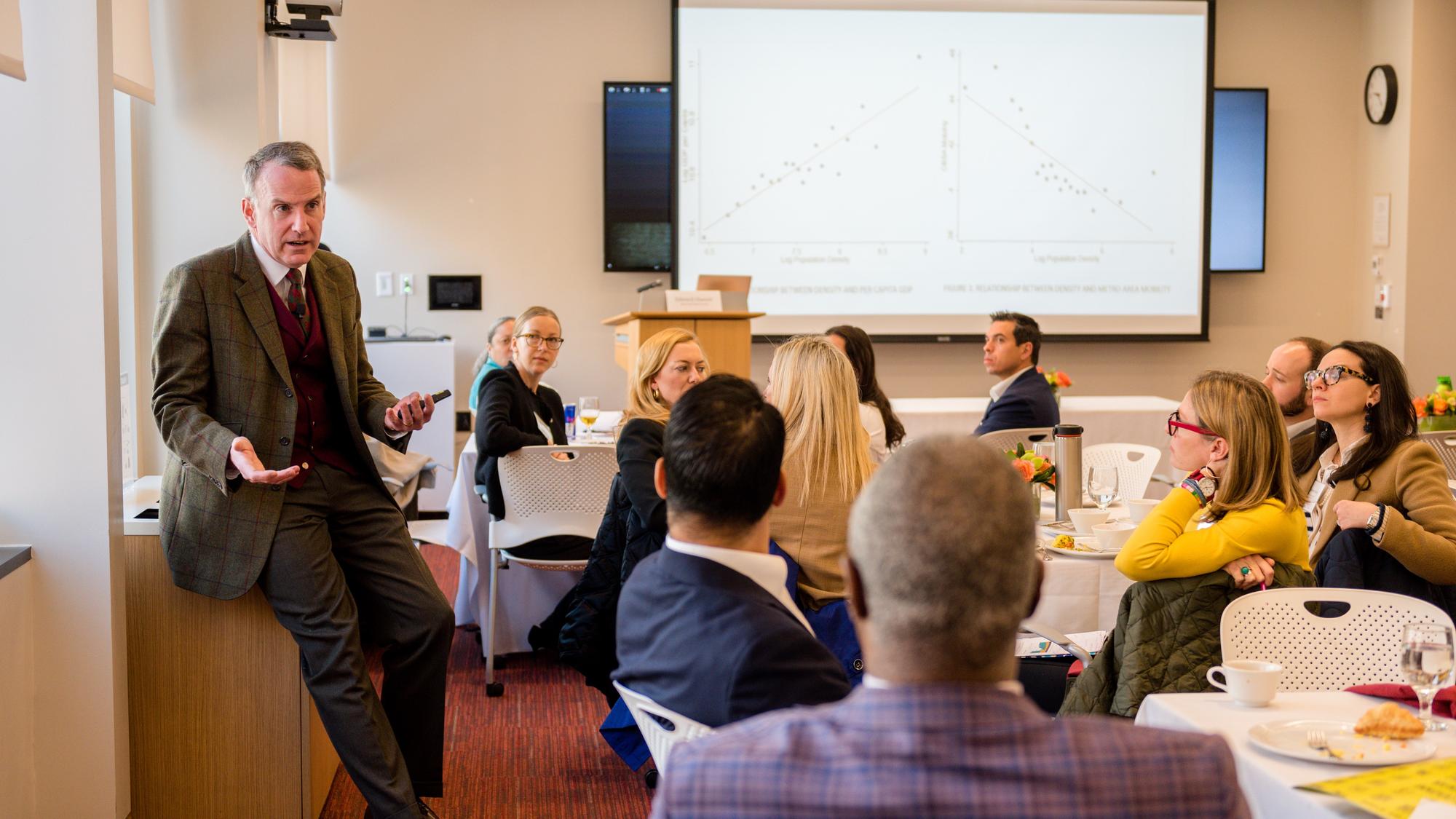- November 5, 2015
- Project on Munipical Innovation
The latest convening of the Project on Municipal Innovation - Advisory Group kicked off with a keynote address by Alan Berube on race, place, and economic inequality in American cities. Following his talk, Berube fielded questions from PMI-AG city representatives, connecting his thoughts to the levers available to public officials. The conversation explored topics such as upward mobility, affordable housing, and the minimum wage – and a translation strategy for turning these items into coherent and realistic municipal policy goals. Highlights from the conversation are excerpted below.
***
There’s a perception that our cities are resegregating more by class than by race now. How does that figure into your evaluation?
Whatever the economic dimensions of the issue, it's unmistakably true that the communities that feel the most disconnected and feel the most under threat of some city policies and practices underway are African American. That's not a class issue, that's a race issue. It behooves us to keep both of these concepts in mind.
If you think about mobility from the second income quintile to the third instead of the first to the second, does that change the levers we have available as public officials?
This is a very important question: mobility for whom? As city officials that have powerful levers, it's important to think about the panoply of policies you have that are important for different parts of the bottom 40%, whether it's helping people move into the labor market and educating kids from poor families, versus the kind of housing, upscaling opportunities, and economic development opportunities that could give the “working poor” just a little boost to get to and maintain a middle class lifestyle. You're very right to point out that this is, in some ways, a different mobility issue than thinking about the people at the very bottom.
"You're the bright spot in American democracy right now."
Some cities are struggling with the fact that communities are not necessarily having the same conversation about inequality. At the community level, folks aren't necessarily engaging in opportunities to bring their families out of poverty. I'm trying to figure out a translation strategy to have this conversation differently with folks who are actually experiencing it, so that there's a way to manage expectations about what's possible in addressing inequality.
There are many ways to measure inequality; it's just a statistical artifice at some level. But the most important thing is whether there is a ladder for families in your cities, in terms of their labor opportunities, in terms of their educational opportunities, and as they climb that ladder, are there still places in your cities for them. I don't think you want to be in the position of saying, "Well the answer to your families’ and your community's problems is addressing 'inequality.'” It’s about providing opportunities to be better over time and have a high quality of life. So it’s semantic at some level, but it's important for making the sell, and helping communities focus on what's important.
We are all city folks here, but there is a role of regional, state, and federal policy. In the interest of not placing the entire burden on cities, what should we take on in the framing of inequality, and what should be the role of higher levels of policy?
For some cities, wage-setting policies can be a real thing. As an economic researcher, but also someone who's concerned about poverty, I'm actually highly supportive of the move to $15/hour minimum wage being made in some cities – especially cities that are largely able to afford that in their regional economies. The role of workforce and economic development should be a city thing, especially in the USA – that’s a local labor market issue. Some cities have more control over educational policies than others. That's something that Washington isn't poised to do very well. By no means did I mean to put the onus on social mobility in all cities on you and your bosses, but frankly, coming from Washington DC and seeing the dysfunction of the federal government around issues for low-income people today, you're the bright spot in American democracy right now. So I’m placing a lot of pressure on you all right now, but you're also performing in a lot of ways that are heartening for people who really believe in cities and urban areas today. There is a federalism to this thing: when it works, it can be great.
If, for instance, we have $50 million to spend on affordable housing, we can either get fewer roofs in better neighborhoods or more roofs in a poorer neighborhood. These are the very real on-the-ground decisions we have to make. I would argue that the better ROI in the immediate is more roofs over people's heads. But over the long haul when you're looking at upward mobility, is it better to have fewer roofs in better neighborhoods?
Neighborhoods really matter, and I think economic researchers have managed to prove that much more definitively than they have in the past. Where you grow up matters. What does that mean to you all? That's an almost existential choice. Where do the really deleterious effects of concentrated poverty start to show up? Most of the best research suggests that it's when the poverty rate is at 30%, certainly if it is above 40% poverty, that it can become a real trap and initiate a serious cycle of decline for a community that is hard to get out of. Building more roofs is a very logical response, but you want to try to do that in a way that doesn't create real desperate pockets of poverty that are hard to reverse.
"Where you grow up matters. What does that mean to you all? That's an almost existential choice.
What are the best-performing cities doing to take away some of the burden to give people opportunity to be more economically mobile?
That's a very good question: is upward mobility a coherent goal for municipal policy? I imagine that it's a combination of having the right sets of supports in place for families and being a healthy local labor market. This is partly in control of cities, but also operates in the wider regional level, and in the short-run, you can't always do something about it. What matters is amassing the kinds of assets that, in the long run, foster growth. Growth makes good jobs, that produce multipliers, that produce a lot more jobs for a lot of people right at that 25th percentile. I have to imagine it's a mix of specific policy interventions cities are taking, and then a little bit of luck and time. So get some of that, too.
Banner Image Credit: Map by Stamen Design under CC BY 3.0





